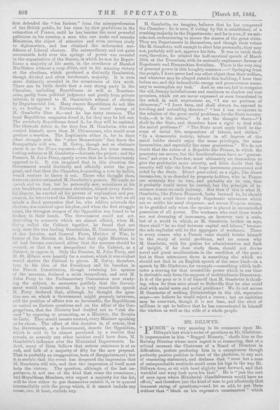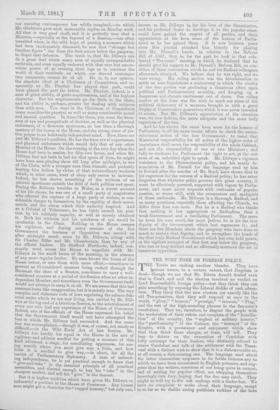MR. DILLWYN.
" pUNO11" is very amusing in its comments upon Mr. Dillwyn's last week's series of questions to Mr. Gladstone. It impersonates in him " Rugged Honesty," chaffs him as the Railway Director whose more aspect is so reassuring, that at a critical moment the Chairman of a Board of Directors in difficulties, prefers producing him in a conspicuous though perfectly passive position in front of the platform, to any sort of reassuring statement, and declares that " none but a man of unimpeachable rectitude could cross his logs in the way Mr. Dillwyn does, or sit with head slightly bent forward, and that watchful and wary look upon his face." He is " just the sort of man upon whom Ministerial blandishments would have no effect," and therefore just the kind of man to put effectively that innocent string of questions,—and, let us add, to put them without that " blush on his expressive countenance " which
our amusing contemporary has wildly imagined,—to which Mr. Gladstone gave such memorable replies on Monday week. All that is very good chaff, and it is perfectly true that a Minister,—especially at the fag-end of a Session,—has often trembled when, in the wild hope of passing a measure which had been inadequately discussed, he saw that "strange but familiar figure " rise from the first corner below the gangway, to dispel that delusion. The truth is, that Mr. Dillwyn can do a great deal which many. men of equally unimpeachable rectitude, and even equally endowed with that rare but uncon- scious power of so crossing their legs as to convince the world of their rectitude on which our shrewd contempo- rary comments, cannot do at all. Ile is, in our opinion, the absolute ideal of a Chairman of Committees, and re- spectably as Mr. Playfair has played that part, could have played the part far better. Mr. Playfair, indeed, is a man of great ability, of great acquirements, and of the highest character. But his acquirements go for little in the chair, and his ability is, perhaps, greater for dealing with subjects than with men. You want in the Chairman of Committees many considerable physical as well as many considerable moral and mental qualities. In times like these, you want the keen- ness of eye and promptitude of decision, as well as the physical endurance, of a first-rate sportsman, no less than a thorough mastery of the forms of the House, and the strong sense of jus- tice proper to an habitually independent mind.. Now, these are just Mr. Dillwyn's qualities. He has the keen eye of a sportsman, and physical endurance which would defy that of any other Member of the House. On the evening of the very day when the House had been in session for fifty-two hours, and when Mr. Dillwyn had not been in bed for that space of time, he might have been seen playing chess till long after midnight, in one of the Clubs, with a younger man than himself, and probably beating him hollow by virtue of that extraordinary wariness which, in some cases, want of sleep only serves to increase. Indeed, he has shown something of the wiriness of an athletic sportsman outside the field of both politics and sport. During the Rebecca troubles in Wales, as a recent account of his life shows, he was one of a small party of magistrates who effected the capture of a large party of rioters, at con- siderable danger to themselves, by the rapidity of their move- ments, and the alarm which their audacity inspired. And as a Colonel of Volunteers, he has fairly earned his posi- tion by his soldierly capacity, as well as merely obtained it. Both his wiriness and his quickness of eye would be invaluable in the Chair. Nothing in the House escapes his vigilance, and during many sessions of the last Government the business of Opposition was carried on after midnight much more by Mr. Dillwyn, acting with Sir Charles Dilke and Mr. Chamberlain, than by any of
the official leaders. Sir Stafford Northeote, indeed, con- stantly went across the House to negotiate with Mr. Dillwyn in the small hours of the morning, in the absence of any more regular loader. No man knows the forms of the House better, or uses them with more effect,—sometimes to prevent an ill-considered measure being rushed through the Houseeat the close of a Session, sometimes to carry a well- considered measure at a period of the Session when no other in- dependent Member, and sometimes even the Government itself, would not attempt to carry it at all. We are aware that this last sentence looks like exaggeration, but it is strictly true. The very complex and elaborate code of laws regulating the salmon fish- eries under which we are now living, was carried by Mr. Dill- wyn at the fag-end of a laborious Session, to the astonishment of every one who had any experience of the House of Commons. Indeed, one of the officials of the House expressed his belief that the Government itself would not have attempted the feat in which Mr. Dillwyn had succeeded. And the same feat was accomplished,—though it was, of course, not nearly as difficult,—in the Wild Birds' Act of last Session. Mr. Dillwyn has hardly his equal in the House in the sort of vigilance and address needful for getting a measure of this kind advanced a stage, for conciliating opponents, for see- ing exactly where you must give way a little, and how little it is needful to give way,—in short, for all the tactics of Parliamentary diplomacy. A man of unbend- ing independence, he is yet practical enough to know that " give-and-take " is the essential principle of all practical assemblies, and shrewd enough to buy his " take " in the cheapest market, and sell his " give " in the dearest.
• But it is higher qualities which have givenM • r. Dillwyn so influential a position in the House of Commons. Any honest man might get a character for " rugged honesty," but only one, known as Mr. Dillwyn is, for his love of the Constitution, and his profound desire to develops it in the popular sense, could have gained the respect of all parties, and their appreciation of his keen sense .of the honour of Parlia- ment as he has gained them. It is now fourteen years since this journal attacked him bitterly for playing into Mr. Disraeli's hands, in relation to the Reform Bill of 1867, that is, for the part he took in that cele- brated " Tea-room" meeting, in which he declared that he should give his support to Mr. Disraeli's Reform Bill, on con- dition of those concessions which he and his Radical colleagues afterwards obtained. We believe that he was right, and we were wrong. His ruling motive was the determination to settle on sure foundations a controversy in which the rivalry of the two parties was producing a disastrous effect upon political and Parliamentary morality, and keeping up a dangerous and chronic excitement out of doors. Our ruling motive at the time was the wish to mark our sense of the political dishonesty of a measure, brought in with a great display of Conservative guarantees which it was never intended to retain. But Mr. Dillwyn's appreciation of the situation was, we now believe, the more adequate and the more truly sagacious of the two.
And he has shown the same keen sense for the honour of Parliament, in all his more recent efforts to check the uncon- stitutional action of the late Government ; to insist that Ministerial responsibility for all policy of the higher order of importance shall mean the responsibility of the whole Cabinet, and not the responsibility of one or two Ministers ; and fully to vindicate for Parliament the right to act, at the cost even of an unbridled right to speak. Mr. Dillwyn's vigorous resistance to the Obstructionist policy, and his manly de- nunciation of Mr. Parnell for the language used by him in Ireland after the murder of Mr. Boyd, have shown that in his eagerness for the success of a Radical policy, he has never forgotten that whatever policy governs this great country, it must be effectively pursued, supported with rigour by Parlia- ment, and must never coquette with outbreaks of popular passion, or worse still, with tho extenuatory and apologists of those outbreaks. Mr. Dillwyn is a thorough Radical, and on many questions, especially those affecting the Church, we differ from him tote code. But he is a Radical who thinks that nothing is less appropriate to Radicalism than a weak Government and a vacillating Parliament. The more he loves his own creed, the more jealous he is for the true dignity of the Government which beet represents it ; and
there are few Members above the gangway who have done so. much to sustain that dignity, and to strengthen the hands of the first truly Radical Government which has ever held power, as the vigilant occupant of that first seat below the gangway, who has so long studied and so effectually mastered the art of tenacious opposition.



































 Previous page
Previous page